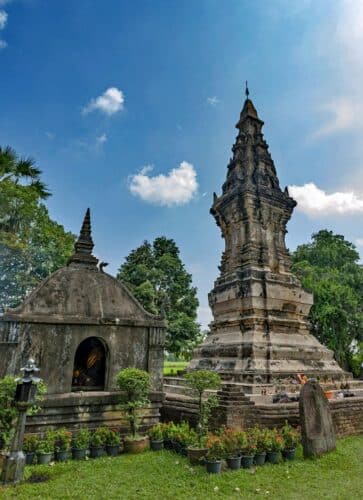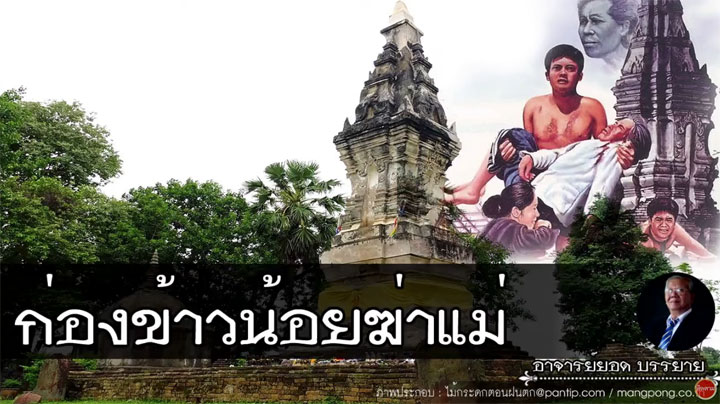Thai Folktale: Rage, Manslaughter and Penance

This is one of the folktales of which there are so many in Thailand, but which are unfortunately relatively unknown and unloved by the younger generation (perhaps not completely. In a cafe it turned out that three young employees did know it). The older generation knows almost all of them. This story has also been made into cartoons, songs, plays and movies. In Thai it is called ก่องข้าวน้อยฆ่าแม่ kòng khâaw nói khâa mâe 'basket of rice little dead mother'.
The story comes from the Isan and is said to be based on an approximately 500 (?)-year-old true event. It is the dramatic story of an ordinary farming family: Mae Tao ("Mother Turtle"), her daughter Bua ("Lotus Flower") and son-in-law Thong ("Gold").
In a fit of rage, Thong kills his mother-in-law Tao when she brings his lunch to the rice field very late and with very little rice. For a full story, read the film's synopsis below.
Near Yasothorn is a chedi (rather thâat: a place where relics are kept), a conversion of the original chedi that Thong built and where the bones of his mother-in-law are said to have been kept (see image above).
The comments I read about this story are mostly about กตัญญู katanjoe: 'gratitude', a keyword in the Thai language, usually that of children towards their parents. Some are more empathetic and cite the very hard life of the Isan farmer, many diseases and poor food as the cause of Thong's sudden outbursts of aggression. I think Thong had a psychiatric disorder, perhaps along with heat stroke during his last tantrum.

The movie about this from 1983
The film is entirely in Thai but very visual at a slow pace and therefore just as easy to follow as the silent films from the beginning of the last century. Very worthwhile also to experience the farm life of that time. I give a short summary:
The film begins with a party in the village. Accompanied by the music of the 'khaen', a group of girls and boys dance towards each other, teasing and challenging each other. That is the origin of the 'ram' dance. Two men bombard each other like horny water buffaloes and everything ends in a short brawl with a reconciliation at the end.
Then we see domestic life and work in the fields. Thong falls ill and there is a so-called 'khwǎn' (spirit, soul) ceremony to help him get rid of it. Thong courts Bua and they flirt. Bua manages to fend off other suitors.
They make love, which angers Thong's brother, but when Bua and Thong declare their love for each other, everyone consents to a marriage that takes place some time later. Thong is an esteemed and kind man and son-in-law.
One day, however, there is an altercation between Thong and his mother-in-law. In a fit of rage, Thong grabs a club and smashes a pitcher to smithereens. He grabs his head and immediately realizes he was wrong.
The rainy season begins. Bua gets pregnant and she is often sick and weak. One night she dreams that her mother is dead: she appears as a ghost in her dream.
Thong begins the heavy plowing of the rice fields. It's hot and the sun burns down mercilessly, Sometimes it wavers. The moment his buffalo cannot go any further and he angrily throws the plow down, he sees his mother-in-law coming running. She is very late because she was in the temple and when she came home she found there a sickly Bua who was unable to bring the food to her husband.
Thong yells at his mother-in-law 'You're so damn late!' and when he sees the little basket of rice, in a fit of anger he takes a stick and strikes his mother-in-law on the head. She falls down. Thong feasts on the food. He gets better, looks around and sees his mother-in-law lying on the floor. She is dead. He takes her in his arms and brings her to the village where the village chief pacifies the angry residents.
Thong appears in court where he is sentenced to be beheaded. He asks the judges a favor: he wants to build a chedi before the execution as a tribute to his mother-in-law. This is accepted after some hesitation.
Thong builds the chedi with Bua bringing him food regularly. Thong is weighed down with grief and guilt. The monks dedicated the chedi and tried to comfort Thong with the Buddhist message of impermanence. But Thong is inconsolable.
In the last scene we see the decapitation. Thong can say goodbye to his wife, 'Take good care of our child,' he says. Bua clings to her family members crying. Just before the sword falls, he sees the ghost of his mother-in-law against the background of the chedi.
Here is an authentic moh lam song about this event:
or this more modern one:


I re-watched the movie and read the story and I believe where I wrote "mother-in-law" it should be "mom." So he does not kill his mother-in-law, but his own mother. They are all called 'mae', mother, hence. And in the past, the man usually moved in with the woman's family, but not here. My apologies.
Dear Tino, according to my love, the story is about his mother.
dear tina,
Of course I immediately asked my girlfriend if she knew this story.
Yes..of course everyone knows this story..she replied.
thanks for this cultural contribution.
good regards from Danny
I also know a version:
a son has been working hard all day in the paddy field and is very hungry and goes home.
At home his mother has food for him.
He is angry with her because he thinks it is far too little food… and kills his mother out of anger and starts eating.
He couldn't finish the food (it was too much) and was very sorry.
A cruel story in our eyes, but with a message: don't get angry too quickly - think before you leap - the eyes are bigger than the stomach 🙂
A forty year old movie about this story. In Thai but with beautiful images and music.
https://www.youtube.com/watch?v=R8qnUQbImHY
Thank you for this beautiful piece of history Tino.
(As a conclusion?) Another tidbit of my joys and sorrows.
The singer of the first mentioned หมอลำ (mǒh lam) song is the singer พรศักดิ์ ส่องแสง (Phonsàk S òngsǎen).
(Are the tones noted correctly?)